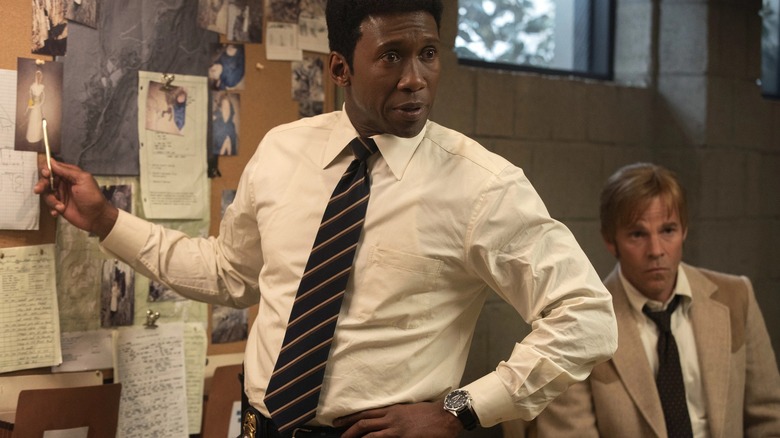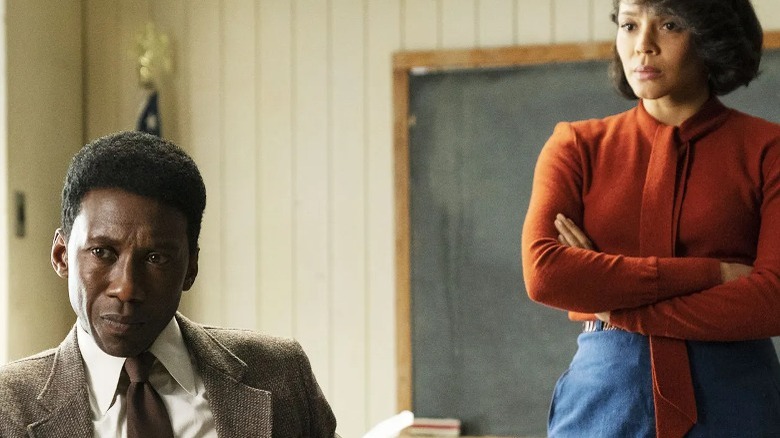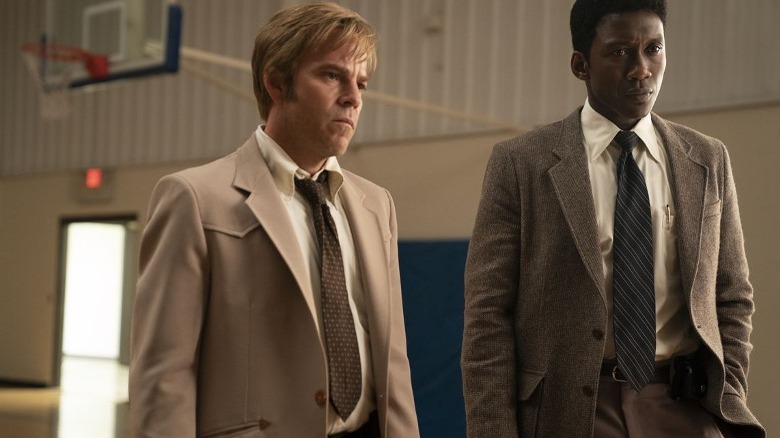True Detective's Creator Thinks Fans Went A Bit Overboard With Season 3 Theories
Nick Pizzolatto's anthology crime series, "True Detective," revolves around people who are haunted by the past. However, in the end, unresolved cases and emotions find their way to justice and closure — here, time is a flat circle, and we are guided by the natural laws of eternal recurrence. Season 3 of the show took these themes to their extremes, where two detectives, Wayne Hays (Mahershala Ali) and Roland West (Stephen Dorff), spend most of their lives chasing some sort of closure about a missing persons case that was first filed in 1980. As a result, the web of interconnected clues that emerged in the narrative's multiple timelines led to a flurry of fan theories, ranging from ones that were probable to those that might be considered obsessively far-fetched.
The answers that season 3 ultimately provided were simpler than the elaborate theories spun on social forums. It was revealed that (spoilers ahead!) Will's death was an accident, and Julie was kept captive for over the course of a decade, and she ended up escaping and marrying a childhood friend. Although we do not get too many details about Julie, it is enough to know that she made it out alive and found happiness after a lifetime of trauma, which is closure enough for Hays and West after they dedicated their entire lives looking for her.
Pizzolatto, who spoke to Esquire about the fan theories for season 3 of the show, discussed dealing with the anxiety of influence when it came to charting a path separate from the passionate theories about the mystery at the center. While Pizzolatto states that some things have been left to interpretation, major aspects of the plot have definitive resolutions in his eyes, whether or not the "True Detective" fandom chooses to agree with him.
Providing measured, straightforward answers
A narrative thread that got picked up by fans was the insinuation that the events of seasons 1 and 3 took place in the same universe, hinting at connections to the Yellow King. This naturally birthed speculations about Carcosa and expanded theories about what the Yellow King signified in the context of the Purcell case, which was reopened after years of going cold. Hays and West, being key investigators, are naturally an integral part of this evolving investigation, and the journey to the past — a mix of factual occurrences and subjective memories — heightens the mysteries that season 3 had to offer.
In his Esquire interview, Pizzolatto clarified that the shared universe tease, while intentional, only served the function of "acknowledging that we recognize that Yellow King story possibility." Just like in real-life, recurring patterns might hint towards a possible theory, but this one ultimately ends up being discredited. Hays realizes that the Yellow King has no bearing on Julie's fate, and this thread does not help shed light on the truth he is pursuing. Thus, it is abandoned, and he's on the hunt for the next clue.
Another major theory, which most fans were positive about, was that Hays' wife, Amelia, might be the killer. This, however, did not turn out to be the case, and it is in fact her lifelong research that helps Hays edge towards the truth. Pizzolatto completely debunks this fan theory:
"That kind of twist isn't something I really considered good storytelling — that I was lying about how I was portraying a character. And it would make Wayne a pretty terrible detective because he was married to this woman for 33 years and he never clocked the fact that she was a murderer."
The truth is not as convoluted as it seems.
Controlling projection
Although Pizzolatto is rather blunt about debunking long-standing fan theories bout season 3, he is not altogether displeased that his show sparked continued discussions well after the finale aired. After all, some narrative threads still warranted discussion, and complex characters deserved more interpretative scrutiny than what Pizzolatto ended up offering. Having said that, the series creator spoke about focusing on his story without giving in to audience expectations, as it is impossible "to control projection." This urged the showrunners to be "as upfront with the viewer as possible," while also holding space for any theories that supported the show's events, except for ones that directly went against the essence of "True Detective."
One theory that is still popular to this day, despite Pizzolatto's insistence on dispelling it, is that Hays' fate bears a resemblance to the Bardo theory, where the transitory state between death and rebirth allows psychological recontextualization of one's life. This triggers an urge to achieve closure, leading to a reconstruction of memory and desire, which is not real in the objective sense of the term. There are several clues that support Hays' "Jacob's Ladder"-esque situation, including time being woven back to Hays disappearing into a jungle in Vietnam, hinting that he might've died during the Vietnam war, while his daughter speaks to him in a way as if he's already dead.
Is Hays' mind dealing with unresolved expectations by creating a vivid reality in which the Purcell case is revolved, mixing memories with desires? The answers are complicated. But what does Pizzolatto have to say? The series creator emphatically states that Hays "definitively did not die in Vietnam, and everything that you witnessed actually happened." While Hays' complex psyche warrants interpretations, the Hays-has-been-dead-all-along theory seems farfetched, despite how convincing it seems.


